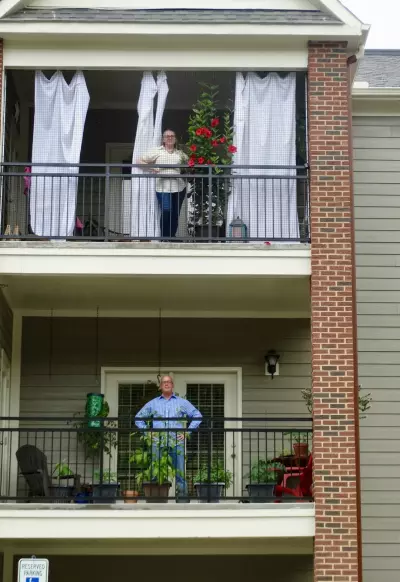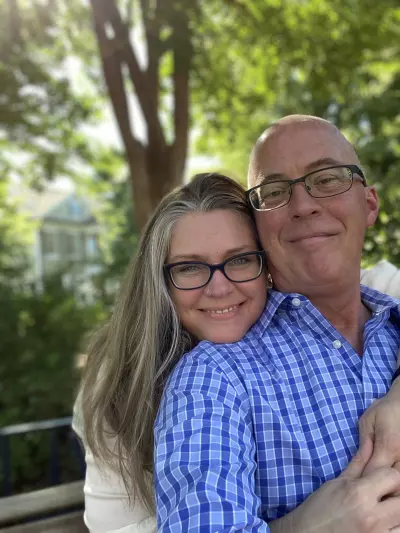Podcast: Play in new window | Download
Subscribe: Apple Podcasts | RSS
Last Updated on October 31, 2023 by Rebecca Huff
What is Living Apart Together
The term “Living Apart Together” means that two people who are in a romantic relationship choose to live separately. LAT arrangements vary; it can be a couple who is married or unmarried. Young couples, and older couples whose spouse may have passed on and choose to commit yet remain unmarried. However, for the sake of this article, the focus is on married people who choose to live apart.
LAT is a non-traditional way to be a couple. Couples living apart together may have different reasons for doing so. Many older couples consider LAT a lifestyle choice. Younger couples often choose this lifestyle to avoid the problems that come with a break-up.
Who am I to write about Living Apart Together? Well, I have the first-hand experience of living it; LAT saved my marriage. David Essel, my guest on this podcast episode has four decades of counseling married couples using this technique.
LAT relationships are simply two people who choose not to cohabit a space.
Being in love, and yet living in separate residences, could be the answer to millions of people who are looking for both a deep connection and inner peace the same time. ~ David Essel
Living apart to save a marriage gives each partner the time and space to heal.
LAT couples who want to succeed will come to a mutual agreement on the terms of the relationship. For most, one boundary is no intimate relationships outside of the nuclear couple. It's best to set boundaries for household living arrangements, what's okay and what's not, etc. Expectations cause anger, resentment, and frustration for couples who live together as well as those who choose separate dwellings.
As David mentions in this podcast episode, it's crucial to set those boundaries, and he suggests putting it in writing. We made a verbal commitment, in the presence of our therapist.
Does living apart together work?
Many married couples stay together because splitting up is difficult. Dividing property and moving are just a couple of obstacles in divorce. There is something wonderful about knowing that you are together because you choose to be, not because it is convenient.
What happens when a couple chooses to spend some time separately is that they have enough space to find that love they once had. Finding out that living apart makes you happier as a couple doesn't mean you should live apart forever. It's an option for sure, but so is living together again once things are sorted out.
Is it healthy for married couples to live apart?
This depends upon the couple. But it is possible for a married couple to live apart and maintain a healthy relationship. If both parties are mutually vested in the relationship they will work at their marriage just as hard as a couple living under the same roof. In fact, some would argue that couples who live separately are allowing their relationship to breathe and grow whereas living under the same roof can lead to feelings of bitterness and being suffocated by their partners' constant presence.
I've seen plenty of examples of married couples who trudge on living under the same roof, unhappily married, bitter towards one another, bouts of the silent treatment, and worse.
What percentage of married couples live separately?
According to data from the US Census Bureau, an estimated four million married couples live apart. In Canada, over 2.9 million LAT Couples are making it work.
Other instances where this works?
- Military families
- Long haul truck drivers
- Firefighters
- People who live far apart due to careers (happens all the time in China)
- A long-distance relationship for other reasons
- Blended families where each parent lives with their child from a previous marriage
While in some of these cases, the couple may only practice LAT part time due to career choices. Many in the younger age group are finding it easier to keep the excitement and enjoyment alive in a marriage when they choose not to practice cohabitation.
Pros of Living Apart Together
- Separate downtime.
- More alone time, especially meaningful for someone who has been raising children for 30+ years
- Your own space to do with as you please
- A greater appreciation for one another
- Appreciate sex more (absence makes the heart grow fonder)
- Reduces the friction that comes from living with a loved one.
- Makes the relationship more interesting
- Less likely to sacrifice their own interests for the happiness of the other
- Fewer reasons and time for arguing
- The ability to have companionship without being smothered by one another
- Less conflict
- More independence
- Less of a tendency to feel stuck
Update August 2021: One reader contacted me to say that they bought their own home in the same neighborhood as her husband, after several years of living apart, they then rented out the second home. You do what works for you!
Cons of Living Apart Together
- Cost: It's expensive, very expensive. Living apart means taking care of two homes, with two sets of utility bills, etc. Although, do you really want the only reason you're living with someone be to save money? Or better yet, is it even affordable? More on this at the bottom of the post. Couples who own two separate homes also have two investments, so perhaps this is not a con?
- Trust issues and Infidelity: Some would say that living apart opens the door for infidelity. Cohabiting hasn't prevented millions of people from being unfaithful, so I'm not sure this counts as a con. Living together is not a magical shield against affairs. People can be in a committed relationship whether they live together or apart. Just like couples can have affairs even though they live together.
- Easier to avoid difficult conversations and problems. Face-to-face chats with your significant other to work through problems is an important part of relationship building and contribute to a happy marriage.
- Social acceptance: Choosing this type of relationship is less socially acceptable than traditional cohabiting relationships. (As David Essel mentions in this podcast episode, some couples fear being judged by their friends.)
- Caregiving: Older people may be concerned about the well-being of their spouse. Living apart presents the challenge of not having someone there to look out for you in case of an emergency. (Falls, cardiac issues, diabetics, etc.)
How we made LAT work
When we made the decision to live apart we were having problems but neither of us wanted a divorce. There were times in our marriage when I couldn't have imagined us spending the night apart much less living separately. Things happen. Long term relationships go through lots of ups and downs.
For our family, LAT made sense a the time because of multiple factors. Our relationship was not getting better after years of ignoring problems. I was feeling suffocated, my husband neglected. I had been in therapy for years trying to work on issues that I had carried into our relationship.
It was my idea to live in separate spaces after several years of living under the same roof but not truly being together. My husband is more agreeable than most men, I think. When I talk with my friends about our living arrangement I often hear “my husband would never agree to that!“

Our situation was that we were both under intense stress for a variety of reasons. During this time we were struggling to keep it all together. We moved into separate apartments to give each other some space to breathe and because neither of us was prepared to let our relationship go, we started seeing a couples therapist.
We had been to therapy before, unsuccessfully. This time we sought out a therapist who was trained in Emotionally Focused Therapy. With this type of counseling, couples “learn to express these emotions in a way that helps connect, rather than disconnect, with [each other].”
That was the key to several breakthroughs that propelled our relationship forward. Dana, at Healing Hearts, was able to decipher our stories in a way that other therapists couldn't even come close to. Since then, I've recommended EFT to several other friends who have gone to other therapists and had the same outcome. A huge boost in understanding, the release of trapped emotions, and a more intimate connection with their partner.
Living Apart Together with Children Involved
In this podcast episode, David mentions separating for the sake of the children, it's something many people have backward. Staying together, fighting, being distant and cold, giving the silent treatment “for the children” is not always the best choice. Even if the couple doesn't fight in front of the children, a marriage where there is no affection is not a good role model for children.
While some people would say that living apart together while raising children is either impossible or simply a bad idea, it has worked for us.
How we Live:
My daughter and I live in the apartment above my husband and our two sons. This is convenient because we visit each other when it's mutually desired. At the same time, we are each free to keep our own space the way we like.
Living next door to one another means that both of us are available when one of our kids needs some emotional support or just wants to spend time together. When my husband is at work, I am available to take my children where they need to go, prepare meals, hang out, or whatever. Even though he spends more time with his co-workers than at home, he frequently Facetimes the children and is available to them anytime they need him.
On my husband's day off, I continue to work at home while he cares for their needs, drives them to lessons, helps with homework, or does laundry. He may hang out in my apartment with our daughter while she does her schoolwork or he may stay up late in his apartment watching a documentary with our son. When he is able to go to bed on my schedule (early) he sleeps with me.
Part of what has made this work for us with children is living within walking proximity to one another. If we had to drive to see one another we could still make it work, but with children still at home, it would be more complicated.
Committed Couples
We are committed to making our relationship work, however, it works. For at least the next year we will be living separately. We have not decided at what point if or when we will live together again. Ultimately, the main reason will probably be financial. The expense of renting two apartments is high. Our relationship is improved to the point we feel we would enjoy living together again. If money wasn't a factor, I could see us living this way long term.
In the future, I expect to come up with a clever solution. I've always wanted to live in a tiny house, so that may happen at some point. In fact, I've thought of a small piece of land where I could build a couple of tiny homes so that we can be close but not too close.
A duplex would be another solution, he could live in one half while I live in the other. Townhomes side by side or nearby would work. I've even seen homes with guest quarters that I felt would work for us. We will see what the future holds!
How do we stay committed?
The fact that we have survived so much in our relationship tells us that we are committed to it and to each other. We have hung on when there was little to hang on to, we have worked for what we've got.
I prepare meals for my husband most of the time, and he frequently cleans my bathrooms, changes my lightbulbs, or waters my plants. It's not that he can't cook and I can't water my own plants, we do these things for one another because “acts of service” is one of our love languages. For me, preparing my husband a meal or organizing his vitamins is a way to express my love for him.
In fact, my desire to provide his meals was one of the threads that kept us together during a really hard time. I knew that in spite of my “feelings” of anger and bitterness towards him, the fact that I wanted to nourish him with healthy food meant that I still cared about him. During hard times, I held on to the hope that it would grow into this “mature love” that I'd hear older couples speak about fondly.
We also had support from people like Dana, our EFT counselor as well as Dr. Janetta Jamerson, my personal therapist.

My husband and I do not behave like single people.
We are a full-time married couple with 18 years of marriage behind us and hopefully many years ahead. Each of us has previous relationship baggage that we've had to work through. In addition, we each have trauma from childhood that has shaped the way we interact with others in close relationships.
Our situation further confirms that each couple will have different reasons for choosing this lifestyle. Couples who face extraordinary challenges and overcome them appreciate their relationship no matter whether they live traditionally, or like us, live apart while staying together.
Now I have experienced what those older couples expressed to me, that before I'd only ever dreamed about. And it is true, those early relationship feelings of infatuation and new love pale in comparison to the deep and abiding love that comes from a relationship that has stood the test of time.
Staying Married but Living Separate Lives
According to many people who have contacted me since I originally wrote this article, many LAT unions fall in the “married but living separate lives” category of couple relationships. Some scenarios I've heard about include the mother and children staying in the family home while the father lives in the mother-in-law detached house.
It seems that in many of the cases couples start out with a trial separation and end up co-parenting and staying close friends. Some with and some without a sexual relationship. In all of the cases I've read about, none of these couples have filed for a legal separation nor do either spouse pay alimony, but most have chosen to write up some form of separation agreement.
Download my free printable-editable Healing Separation Agreement.
In other cases, the couple simply chooses to sleep in separate bedrooms. This is the category my husband and I seem to be most comfortable with. In which case you may need to purchase an extra bed and mattress, or even furnish a second home.

The bottom line is couples who are open to prioritizing what works for their relationship and focusing less on what other people think (mostly about whether or not they have a sex life and if they are being unfaithful) tend to find a way to stay married and happy.
Update 2021
During the coronavirus pandemic, there was a rise in demand for therapists – both individual and couples therapy. Mental health topics were trending. For the longest, I saw my therapist every two weeks. Last year (2020) for the first time in a very long time, I stopped seeing my therapist. Then in early 2021 we moved back in together. I won't say that cohabitation has been a breeze, but at the same time the quality of our togetherness has also improved after a two-year stint living apart.
I'm following what sociologists have to say on the subject of love and living together as I have found it is not a requirement to a successful relationship and in some cases to be a hindrance. From the emails I have received over the past two years I'd say many of you are in agreement (and some not!) The demographic appears shows many older women are choosing this lifestyle.
May 2021 – We were interviewed for podcast with Stephanie Foo, Home Made all about being alone, the episode is titled Home Alone and our portion begins around minute 12:00.

Healing Separation with the Goal of Staying Together
Last Updated on June 29, 2022 by Rebecca Huff Today we are chatting about marital issues when things start going bad. Does a separation clearly indicate divorce? Could it save your marriage? What about divorce and separation without plans to get back together? How does all of this work and what path should you take? …

When and How to Write Your Own Healing Separation Agreement
Last Updated on October 31, 2023 by Rebecca Huff If you're thinking about a separation with the intention of saving your marriage, you may be too overwhelmed to think about what to put into a healing separation agreement. That's understandable. It's a stressful and frustrating transition. I think we need to change the way we …
Unmarried couples who choose to live apart together because they choose not to marry in the first place, will not have the same legal rights as married couples who decide to live apart. Some married couples choose LAT to keep health insurance, social security benefits and other financial and health benefits that may come with marriage.
Update 2022
Last year I had gene testing done which gave me so much helpful information. First, I discovered that I have genes that make me more likely to be irritable, have anxiety, depression, and low Vitamin D. My poor husband! Just kidding, it's never just one person. Though, I will admit once I had my results, I have learned to adapt to my moods better. If you're interested, the company I used is Self Decode and I wrote a review here.
Genetic Testing at Home – My Review of SelfDecode
Last Updated on October 11, 2022 by Rebecca Huff I always thought I didn't want to know if I had bad and rare genes that could turn on me and make me sick. If I knew I had a bad gene, wouldn't I be expecting to have disease? Well, that is what I used to …
We are still living together under one roof again, in separate bedrooms. Our relationship is much better and we are happier than we have been in about 15 years!
I'd also mention that I appreciate you sharing your story with me via email. I've heard so many interesting living arrangements since I originally wrote this article. Needless to say, there are many ways to do lat relationships. Separate homes isn't always an option, as many of you have mentioned; though so many married couples are making it work by carving out each their own space.
Keep the feedback coming! I love reading your stories. Contact me here.
Is it healthy for couples to sleep in separate beds?
Last Updated on September 14, 2022 by Rebecca Huff So you've been short-changed in the sleep department due to sharing your bed? Can't remember the last time you got a good night's rest? I feel your pain! If your spouse, kids, or fur-babies are keeping you up at night, and you're wondering if it's healthy …
About David Essel
David Essel, M.S. is the best selling author of 9 books, a counselor and master life coach, and an inspirational speaker whose work is endorsed by celebrities like Jenny McCarthy, Wayne Dyer, Kenny Loggins, and Mark Victor Hansen. David accepts new clients monthly via Skype and phone sessions from anywhere. Find David at TalkDavid.com

Source: https://www.psychologytoday.com/us/therapy-types/emotionally-focused-therapy




 Ratatouille Omelette with Goat Cheese and Microgreens
Ratatouille Omelette with Goat Cheese and Microgreens
Not sure about living apart is the solution for all, as this most times leads to adultery. But some sleep in different rooms in the same house, so their children can see both parents day and night.For children should not have to suffer, not seeing both Parents, because of the couples differences. If parents can focus more on making their children emotionally happy, as a team together discussing and coming to some agreements, without arguments, maybe, just maybe the love the parents show to their children, may or most likely will enlighten the purpose of their marriage in the first place. Where they share a bond- their precious children that loves to see Mummy and Daddy working and agreeing together in peace. In doing this, can build and restore. relationships, and even makes it stronger.
Thank you for that. For in my situation, I want my children to have both worlds, (meaning both parents). As I was contemplating on separation, but then I thought of how it could destroy my children emotionally. For I have seen the results of children that are affected, having emotional problems, due to their parents who have separated.
I agree that living apart is not the solution for all. In fact, I know some married couples who believe that even sleeping in separate rooms is detrimental to their children’s mental health.
Perhaps separation can lead to adultery, but living together does not prevent adultery. Lots of married and living together couples end up having affairs. Is it easier when you live apart? Perhaps, but I think when someone wants to have an affair they’re going to whether they live with their spouse or not. In our case, and in many cases, the goal is to save the marriage, and that is the purpose of this article, the idea of a HEALING separation, not separation with the intent of terminating the marriage.
Each family has to do what’s best for their unique situation. In our case, our children did see us both every day and night and could take a few steps and be with either parent. Scarcely different than living in a two story house with the exception that we each had our own complete living spaces. T
Concerning children not having to suffer because of parents differences, I can only say that children suffer when parents are suffering because of their differences. There are way to many factors to be able to make a blanket statement – staying together is better for the children, or splitting up saves them stress, even psychological research is split on the topic.
If only it could be as easy as the parents working together to show their children love and that would wash away all of the problems, however it’s not that easy – emotional scars or other factors that parents didn’t even know were an issue until they had children. Coming to agreements without arguments, I mean it all sounds lovely, but if married couples could do all of these things so easily, this article wouldn’t have been written.
In our case, separation while we actively worked on our relationship worked.
This has been fascinating. Please do leave an update!
Thanks! I’m working on an update now 🙂
Thank you for this because my wife and I were trying a separation and I wasn’t sure about moving back in together. I felt kind of stupid about my feelings but I’m glad to hear it’s a thing!
Feelings are feelings, definitely nothing to feel stupid about! It’s been a journey for us and I plan to share an update since we lived apart for nearly two years and just recently moved back in together. Hope it all goes well for you!!